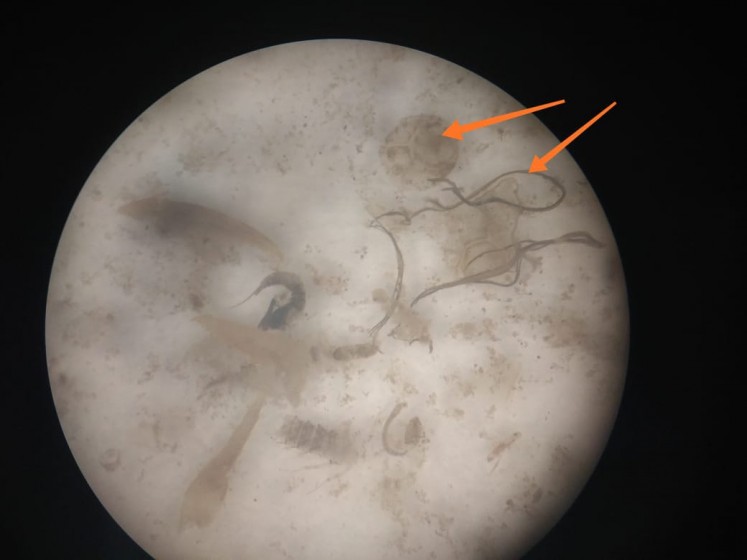Popular Reads
Top Results
Can't find what you're looking for?
View all search resultsPopular Reads
Top Results
Can't find what you're looking for?
View all search resultsFish in Brantas River ingest disposable diapers: Study
Change text size
Gift Premium Articles
to Anyone
A
study has found that 21 fish species in the Brantas River in East Java are threatened by solid waste that is dumped into the water, including disposable diapers.
In its latest study, Ecological Observation and Wetlands Conservation (Ecoton) estimated that half a metric ton of disposable diapers was dumped into the river each year. They calculated the figure after conducting 30 clean ups at one sluice gate in a year.
“Imagine, we got that number only from the samples we took from one sluice gate, Karangpilang,” said Prigi Arisandi, executive director of Ecoton, on Tuesday.
A microscopic picture of the stomach of a fish taken from the Brantas River shows the fish had ingested plastic fibers and fragments. (Courtesy of Ecoton/-)Ecoton’s research manager Riska Darmawanti said the organization had found plastic fibers akin to those found in diapers in the stomachs of several types of fish, including those known locally as rengkik, nila, keting, bayer merah, bader putih and jendil. The researchers found the plastic fibers in 80 percent of the fish they examined.
“When disposable diapers are immersed in water and exposed to sun shine, over time the diapers break down into smaller pieces. The fish swallow the pieces, which can be transferred from the stomach to the meat. When people eat the fish, the plastic will be transferred to their bodies,” Riska explained.
Ecoton said solid waste had also contaminated the river water with plastics, compromising the health of 3 million tap water customers in Surabaya.
Ecoton urged the city administration to protect the rivers from solid waste, especially diapers. Recently, it took its protests to the streets, along with colleagues from the Diaper Evacuation Brigade Community, to urge the administration to remove diapers from the Brantas River.
Andreas Agus, a researcher at the community, said residents commonly ate keting and rengking fish.
Ecoton also called on the public to return to using reusable cloth diapers.
Read also: Editorial: Diabolical plastic
“Consumers must change their behavior, the more comfortable a product makes us, the more threatening it is to our lives,” Agus said.
East Java Governor Soekarwo called on mayors and regents to pay serious attention to solid waste in rivers.
East Java administration spokesperson Benny Sampir Wanto said the governor had asked regents and mayors to establish waste sorting facilities and instruct residents not to dump waste into rivers.
In December 2017, three residents, including Riska from Ecoton, filed a lawsuit against the governor. They accused the governor of showing negligence toward the management of disposable diaper waste in the Brantas River.
Last year, the United States-based NGO Trash Free Seas Alliance (TFSA) revealed that micro plastics had been found in 28 percent of fish in Indonesia’s markets. The micro plastics come from plastic waste that enters rivers and ends up in the sea.











